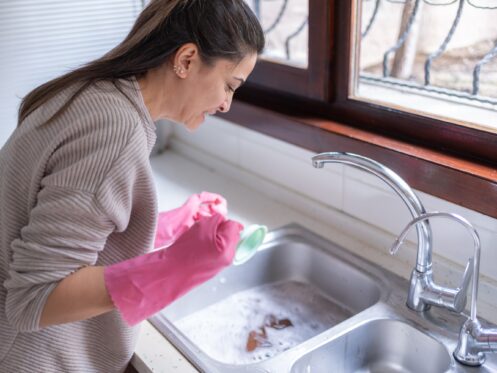Dirty, foul-smelling drains can make it all but impossible to enjoy your Albany, OR home. Unfortunately, these odors aren’t confined to tubs, shower pans, sinks, or plumbing-connected appliances. They can permeate the air and make your entire living space feel unclean. Worse still, many of the problems that lie behind dirty drains increase indoor humidity, too. If you have strange smells coming from one or more of your drains, read on to find out why.
Built-Up Debris
Even swift-moving drains can develop heavy buildups of debris over time. This debris includes:
- Grease
- Soap scum
- Hair
- Residual food
- Mineral limescale
Pathogens within drains thrive on this organic matter. As collected debris rots and bacteria and other microorganisms feed on it and flourish, you’re bound to catch a whiff of something unpleasant when standing near your drains.
The pathogens that live within pipes and drains also create a slimy, smelly substance known as biofilm. Biofilm is a stew of bacteria, fungi, and viruses that have wrapped themselves in a protective extracellular polymeric substance (EPS). Not only are biofilms extremely odorous, but they’re also more resistant to bleach and other cleaning agents.
The best way to get rid of smelly buildups and biofilm is by scheduling regular drain maintenance. Services like hydro-steaming, hydro-jetting, and mechanized drain snaking will slough waste off and push it toward the municipal sewer main. You should schedule preventative drain cleaning service as a maintenance task once each year for all your home plumbing fixtures.
An Impending Backup
Far worse than having a single smelly drain is having all of your drains emit foul odors at once. If all of your drains are blocked, slow-moving, or subject to frequent clogs, you may have an impending whole-house backup. During a whole-house backup, waste and wastewater come rushing back into homes via all connected appliances, drains, and pipes. Not only can these events cause significant property damage, but they also expose residents to extremely dangerous chemicals and pathogens.
All your drains converge onto a single sewer line. This underground pipe routes your effluence to your septic tank or the municipal sewer system. When sewer lines are encroached upon by tree or weed roots, develop offset sections, or have age-related build-ups and cracks, moving waste has nowhere to go but back where it came from.
Plumbers can use hydro-jetting or rooter machines to clear sewer line blockages. They can also send sewer line cameras into plumbing systems to determine the underlying causes of whole-house backups and the exact locations of problems.
Dry P-Traps
P-traps are the small, U-shaped pipes just beneath plumbing drains. Their distinctive shape keeps sewer gases from entering the living space. P-traps work best when they have small amounts of water at their lowest points. If you haven’t used a drain in a while, its p-trap could be too dry to do its job effectively. Have a plumber check for a dirty, dry, or damaged p-trap if your drain has a pungent, rotten egg or rotten cabbage smell.
Insufficient Garbage Disposal Maintenance
If your kitchen sink drain is smelling especially ripe, your garbage disposal might be the culprit. Trapped food debris could be releasing odors as it decays. Fortunately, there are several easy and natural ways to freshen these appliances without dulling their impellers or risking injury. For instance, you can add ice cubes and a small amount of salt to your garbage disposal while it’s running. You can also slice up a lemon and run it through the disposal.
You can also freshen your kitchen sink by adding equal amounts of white vinegar and baking soda to its drain, then flushing with hot water. When combined, these common pantry items have an instant, foaming reaction that breaks moderate buildups of grease and food down. It won’t work for major build-up, but is handy for occasional at-home maintenance.
You can avoid garbage disposal odors by limiting what you put into this unit. Avoid grinding up tea bags, coffee grounds, egg shells, potato peels, nuts, fibrous vegetables, and large amounts of starchy foods. Put the majority of your food waste into your compost bin or garbage can, and use your garbage disposal for residual food waste only.
Stagnant Water or Water Quality Concerns
Drain odors might be an indication of water quality problems. Check your tap water. Is it cloudy or discolored? Does it smell bad even when you hold it away from the drain? You may have a broken water supply pipe or a backflow issue.
Clogged drains are one of the most common plumbing problems we can help you with. We also offer expert sewer cleaning, sewer line camera inspections, repiping, and sewer line repairs. If you have smelly, slow-moving drains in your Albany home, contact Linn Benton Plumbing now!
